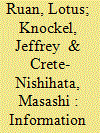| Srl | Item |
| 1 |
ID:
148131


|
|
|
|
|
| Summary/Abstract |
How do humanitarian non-governmental organisations (NGOs) define and institutionalise global accountability standards? This article process-traces the case of the Humanitarian Accountability Partnership-International (HAP-I), a voluntary, self-regulatory collective accountability initiative, to investigate the processes through which NGOs define collective rules, standards, and practices for accountability. This article shows the limitations of traditional representative and principal-agent models of NGO accountability when applied to the global inter-organisational realm and argues that mutual accountability better conceptualises these relationships. In this important case, the article finds that transnational coordination of NGO accountability practices results from social learning that generates a global accountability community (GAC) constituted by mutual engagement, joint enterprise, and a shared repertoire of practices. Data from the process tracing shows a collaborative not hierarchical or coercive relationship between NGOs and states, where salient donors changed their understandings and practices of accountability during the process of developing the HAP-I benchmarks. Thus, GACs both regulate the behaviour of members and constitute their social identities, interests, and practices.
|
|
|
|
|
|
|
|
|
|
|
|
|
|
|
|
| 2 |
ID:
179772


|
|
|
|
|
| Summary/Abstract |
When does repression of online expression lead to public punishment of citizens in China? Chinese social media is heavily censored through a system of intermediary liability in which the government relies on private companies to implement content controls. Outside of this system the Chinese authorities at times utilize public punishment to repress social media users. Under China’s regulatory environment, individuals are subject to punishment such as fines and detention for their expressions online. While censorship has become more implicit, authorities have periodically announced cases of repression to the public. To understand when the state escalates from censoring online content to punishing social media users for their online expressions and publicizes the punishment, we collected 468 cases of state repression announced by the authorities between 1 January 2014 and 1 April 2019. We find that the Chinese authorities most frequently publicize persecutions of citizens who posted online expression deemed critical of the government or those that challenged government credibility. These cases show more evidence of the state pushing the responsibility of ‘self-regulation’ further to average citizens. By making an example of individuals who post prohibited content even in semi-public social media venues, the state signals strength and its determination to maintain authority.
|
|
|
|
|
|
|
|
|
|
|
|
|
|
|
|
| 3 |
ID:
108312


|
|
|